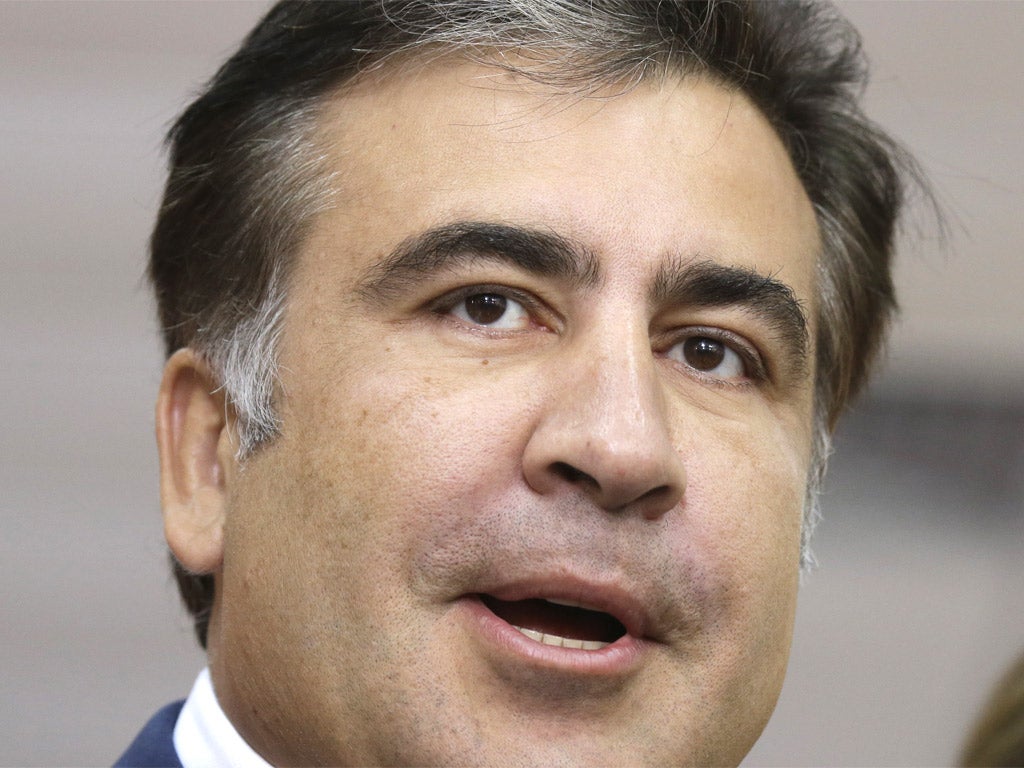Calls for President Mikheil Saakashvili to step down after shock poll result in Georgia
Saakashvili concedes defeat in parliamentary election, but says he intends to stay on

The leader of Georgia's opposition coalition yesterday called on the President, Mikheil Saakashvili, to resign and call snap presidential polls.
After securing a shock victory in Sunday's parliamentary vote, billionaire Bidzina Ivanishvili said the honourable thing would be for the president to leave office. Mr Saakashvili has been president since the 2003 "rose revolution" and has a year left to rule, but would have to do so with a parliament controlled by his foes. "The only right thing for him to do now is to resign," said Mr Ivanishvili. "This would be good for himself and his future."
Earlier, Mr Saakashvili conceded that his United National Movement had been defeat by Mr Ivanishvili's Georgian Dream coalition, paving the way for the first ever transfer of power through the ballot box in the history of Georgia, a key Nato ally.
It appears, however, that Mr Saakashvili intends to see out his term, leaving the prospect of a political conflict between president and parliament for the next year. While the full results are still not known, Georgian Dream won well over 50 per cent of the popular vote and is set to take over half the parliamentary seats. Representatives of the 1,600 international election monitors in the country announced yesterday that, though there had been some irregularities and biased media coverage, the vote was largely free and fair.
In a press conference in which at times Mr Ivanishvili appeared to be making up policy on the spot, the victorious leader said that no ministers in the current government could keep their jobs, and added that while there would be no witch-hunt, some current officials who had committed criminal acts would be put on trial.
Responding to a question over whether the organised crime bosses neutered by Mr Saakashvili would be allowed to return to the country, he snapped angrily at the reporter that she was a Saakashvili plant.
Mr Ivanishvili, who made his money in Russia and had been accused during the campaign of being a Kremlin stooge, also said yesterday he would not change Georgia's West-looking orientation and would continue to seek further integration with Nato and the EU. He added, however, that he wanted to see better relations with Russia and boost trade and cultural links, which were largely severed in the aftermath of the 2008 war between the two countries.
He said Mr Saakashvili had behaved "like a toreador waving a red flag at a bull" in his policy towards Russia. Mr Saakashvili's aides had confidently predicted victory right until the eve of Sunday's vote, but the government underestimated discontent in the country over concerns about rule of law and democratic reforms.
In a campaign that was largely based on vitriolic criticism of the other side, both camps portrayed the other as dangerous and dictatorial, but in the end, fatigue with nine years of Mr Saakashvili's rule proved decisive.
"You know well that the views of this coalition were and still are fundamentally unacceptable for me," said Mr Saakashvili. "We believe that their views are extremely wrong, but democracy works in a way that Georgian people make decisions by majority."
What happens next?
* Bidzina Ivanishvili's Georgian Dream coalition has won a majority in parliament, which is sufficient to appoint a new Prime Minister. Until now, parliament was dominated by President Mikheil Saakashvili's United National Movement party.
* Presidential elections are due late next year. Mr Saakashvili, having completed two terms, cannot stand.
* Currently, the President has more powers than the Prime Minister, but constitutional changes after the next presidential election will rebalance these powers in favour of parliament and the Prime Minister.
Subscribe to Independent Premium to bookmark this article
Want to bookmark your favourite articles and stories to read or reference later? Start your Independent Premium subscription today.

Join our commenting forum
Join thought-provoking conversations, follow other Independent readers and see their replies